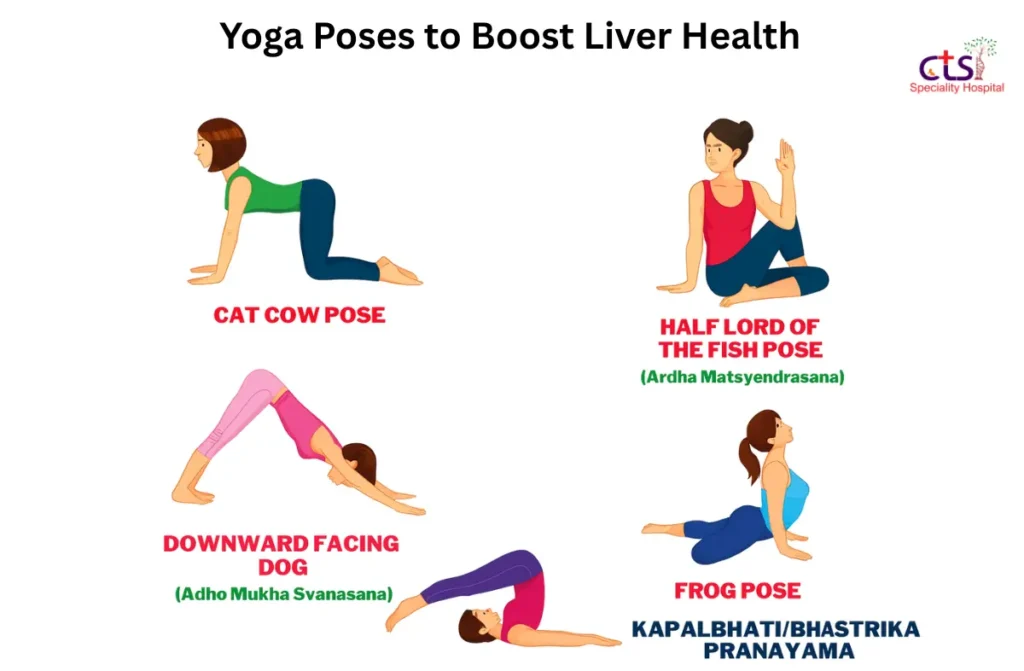When dealing with liver disease, finding the right way to maintain your health is essential. The Best Exercise for Liver Disease can help improve liver function and overall well-being. Regular physical activity can have a positive impact on liver health, regardless of whether you are dealing with fatty liver, cirrhosis, or other liver-related issues. In this blog post, we will explore the best exercise to reduce fatty liver and discuss how exercise can benefit your liver health.
What we know about Best Exercise for Liver Cirrhosis
Cirrhosis is a severe condition that affects liver function. It’s important to approach best exercise for liver cirrhosis carefully. Regular physical activity can be beneficial, but it’s crucial to consult your best heapatologist before starting any new exercise program.
- Low-Impact Exercises: For those with liver cirrhosis, low-impact exercises such as walking or gentle yoga can be ideal. These exercises are easier on the body while still providing health benefits.
- Personalized Plans: Every individual’s situation is different, so a tailored exercise plan is essential. This may include working with a physical therapist or fitness professional who understands liver disease.

Benefits of Best Exercise for Liver Disease
Engaging in regular exercise offers numerous benefits for your liver and overall health. Here are some key advantages of being physically active:
- Improves Liver Function: Regular exercise can enhance liver function by helping to reduce fat in the liver and improving blood circulation.
- Weight Management: Exercise aids in maintaining a healthy weight, which is vital for preventing and managing liver disease.
- Enhanced Mood: Physical activity releases endorphins, helping to reduce stress and improve your mood, which can be beneficial for those coping with chronic liver disease illnesses.
- Stronger Immune System: Regular exercise can help boost your immune system, making it easier for your body to fight off infections and illnesses.
Exercise and Liver Function
Understanding how exercise affects liver function can help you make informed decisions about your fitness routine. Here are some important points to consider:
- Fat Loss: best exercise for alcoholic fatty liver helps in reducing liver fat, which is particularly important for those with fatty liver disease.
- Blood Flow: Physical activity increases blood flow to the liver, promoting its ability to filter toxins from the body.
- Detoxification: Regular exercise supports the liver in detoxifying the body, helping it function optimally.
Exercise and Insulin Sensitivity
Improving insulin sensitivity is crucial for liver health, especially for those with fatty liver disease. Here’s the best workout for fatty liver that helps you:
- Better Glucose Control: Exercise improves how your body responds to insulin, helping to regulate blood sugar levels effectively.
- Reduced Fat Accumulation: By enhancing insulin sensitivity, exercise can reduce fat accumulation in the liver, which is essential for preventing further liver damage.
- Overall Health: Improving insulin sensitivity can also lower the risk of developing type 2 diabetes, which is often linked to liver disease.
What Drink is Good for the Liver?
Keeping your liver healthy requires proper hydration and the right beverages. Some drinks help detoxify the liver, improve function, and reduce fat buildup.
Best Drinks for Liver Health
- Green Tea: Rich in antioxidants, it supports liver detoxification and reduces inflammation.
- Coffee: Helps lower the risk of liver disease and improves enzyme levels.
- Lemon Water: Flushes out toxins and aids digestion.
- Beetroot Juice: Packed with nitrates and antioxidants that enhance liver function.
- Turmeric Tea: Contains curcumin, which reduces liver inflammation and improves bile production.
How Drinks Support Liver Health?
- Improve digestion and bile production.
- Help detoxify and remove harmful toxins.
- Support weight management and reduce liver fat.
Along with a healthy diet, incorporating the best exercise to reduce fatty liver, such as walking or cycling, enhances liver function and overall well-being.
Exercise and Inflammation
Regular physical activity can play a significant role in reducing inflammation, which is vital for liver health. Here’s how exercise helps combat inflammation:
- Anti-Inflammatory Effects: best exercise for liver disease has anti-inflammatory effects on the body, which can help reduce liver inflammation.
- Enhanced Recovery: By promoting circulation and blood flow, exercise can aid in the recovery of liver tissue, supporting overall liver health.
- Improved Body Composition: A healthier body composition achieved through regular exercise can lead to reduced inflammation and better liver function.
10 Best Exercises for Liver Disease
Liver disease can be managed and even improved through regular physical activity. Exercise helps in weight management, reducing fat accumulation in the liver, and improving liver function. Below are ten effective exercises for liver health.
1. Walking
Walking is a simple yet effective exercise that enhances liver function.
- Aids in weight loss and reduces liver fat.
- Improves blood circulation, promoting liver detoxification.
- Helps in maintaining a healthy BMI, crucial for liver health.
- Low-impact and suitable for all fitness levels.
Walking is considered the best exercise for alcoholic fatty liver as it gradually improves metabolic functions. It also ranks among the best workout for fatty liver, helping prevent liver damage over time.
2. Cycling
Cycling is an excellent cardiovascular exercise beneficial for liver health.
- Helps in burning calories and reducing fat accumulation.
- Strengthens the heart and boosts circulation, improving liver function.
- A low-impact exercise suitable for all age groups.
- Enhances insulin sensitivity, which is beneficial for those with liver disease.
For individuals struggling with fatty liver, cycling is among the best exercise for alcoholic fatty liver as it enhances fat metabolism. It is also an ideal best workout for fatty liver, promoting overall well-being.
3. Swimming
Swimming is a full-body workout that supports liver health.
- Increases cardiovascular endurance and reduces liver fat.
- Enhances muscle tone and overall body strength.
- Relieves stress, which can contribute to liver inflammation.
- A low-impact exercise that is easy on the joints.
Regular swimming sessions help in managing liver disease by reducing body fat percentage and improving circulation.
4. Yoga
Yoga is a great way to support liver function naturally.
- Certain poses improve digestion and liver detoxification.
- Reduces stress levels, preventing liver-related complications.
- Enhances flexibility and muscle tone.
- Stimulates internal organs, aiding in liver regeneration.
Some effective yoga poses for liver health include the Cobra Pose and Seated Twist.
5. Strength Training
Strength training exercises are beneficial for individuals with fatty liver.
- Helps in increasing muscle mass and improving metabolism.
- Reduces visceral fat, which can accumulate in the liver.
- Enhances insulin sensitivity, preventing liver disease progression.
- Boosts energy levels and overall fitness.
Lifting light weights or using resistance bands can be highly effective in maintaining liver health.
6. Pilates
Pilates strengthens core muscles while enhancing liver function.
- Improves posture and flexibility, benefiting the liver.
- Enhances core strength, which supports better digestion.
- Reduces stress, which is linked to liver inflammation.
- Encourages deep breathing, helping in liver detoxification.
Pilates is also considered an ideal best workout for fatty liver, as it promotes overall body conditioning.
7. High-Intensity Interval Training (HIIT)
HIIT workouts are highly effective for fat loss and metabolic improvement.
- Burns excess fat, reducing the risk of fatty liver disease.
- Enhances cardiovascular health, boosting liver function.
- Increases metabolism, leading to long-term fat loss.
- Short and efficient workouts provide maximum benefits.
HIIT is among the best exercise for alcoholic fatty liver, as it rapidly improves metabolic rates.
8. Aerobics
Aerobic exercises are excellent for improving liver health.
- Helps in reducing liver fat through cardiovascular training.
- Improves oxygen circulation, aiding in liver detoxification.
- Boosts stamina and overall endurance.
- Can be done at varying intensity levels based on fitness levels.
Zumba, dance aerobics, or step aerobics are fun ways to keep the liver healthy.
9. Tai Chi
Tai Chi is a gentle exercise that supports liver function.
- Reduces stress, which can worsen liver disease.
- Improves balance and muscle control.
- Encourages deep breathing, which supports detoxification.
- Helps in maintaining a healthy weight, reducing liver fat.
Tai Chi is a low-impact exercise that can be done daily for long-term benefits.
10. Resistance Band Exercises
Using resistance bands can improve muscle strength and liver function.
- Helps in increasing metabolism, preventing fat buildup in the liver.
- Enhances flexibility and overall mobility.
- Low-impact and suitable for all age groups.
- Supports fat loss without putting stress on the joints.
Incorporating resistance band workouts into a fitness routine can help manage fatty liver disease effectively.
More Exercise Considerations for People With Liver Disease
Before starting best exercise for liver disease, there are some important considerations for those with liver disease:
- Consult Your Doctor: Always check with your healthcare provider before beginning any new exercise program, especially if you have liver disease.
- Start Slow: If you’re new to exercise, start with short sessions and gradually increase intensity and duration.
- Listen to Your Body: Pay attention to how your body feels during and after exercise. If you experience pain or discomfort, stop and consult your doctor.
- Stay Hydrated: Drink plenty of water before, during, and after exercising to stay hydrated.
Conclusion
Finding the best exercise for liver disease is crucial for improving liver function and overall health. Incorporating a mix of aerobic exercise, resistance training, and gentle activities like yoga can significantly benefit your liver. If you or someone you know is struggling with liver disease, consider reaching out to CTS Hospital for more information and personalized advice. Contact us today to learn how we can support your liver health journey!
